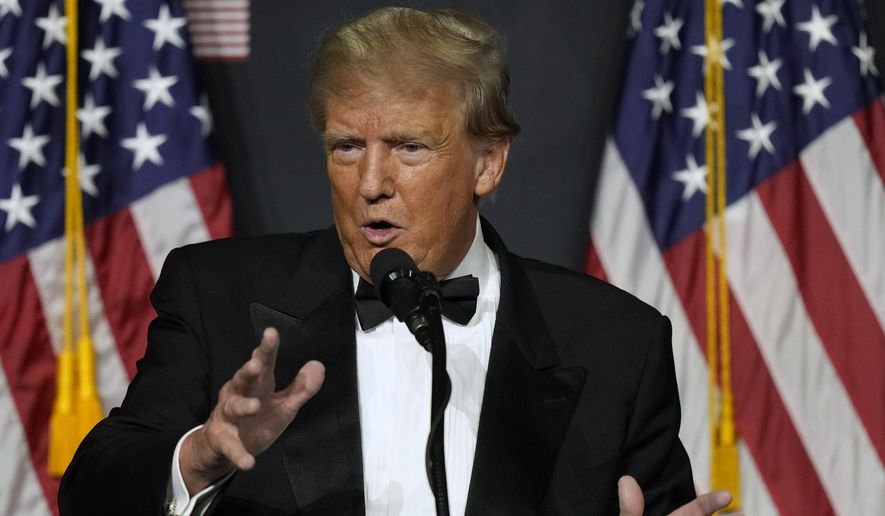A federal appeals court on Thursday shut down the special master review of government documents seized by the FBI during its search of former President Donald Trump’s Mar-a-Lago residence, a crushing legal defeat for Mr. Trump.
A three-judge panel for the 11th U.S. Circuit Court of Appeals concluded unanimously that a Florida federal judge never should have appointed the special master in the first place.
Two of the judges on the panel were appointed by Mr. Trump and a third by President George W. Bush.
The panel said the decision sets a bad precedent because any target of a criminal investigation could use it to get a special master and slow down the case before an indictment is issued.
“The law is clear,” the 11th Circuit judges wrote. “We cannot write a rule that allows any subject of a search warrant to block government investigations after the execution of the warrant. Nor can we write a rule that allows only former presidents to do so.”
Either approach, the court said, would amount “to a radical reordering of our caselaw limiting the federal courts’ involvement in criminal investigations.”
Doing so “would violate bedrock separation-of-powers limitations,” the appellate court said.
Mr. Trump can appeal the decision to the U.S. Supreme Court.
The three-judge panel strongly rebuked arguments raised by Mr. Trump’s attorneys that the Presidential Records Act empowers presidents to declare government documents as personal property.
That argument was labeled “a sideshow” by the judges, who said the status of the documents should be decided in future legal proceedings, not by an independent arbitrator.
“The magistrate judge decided that issue when approving the warrant. To the extent that the categorization of these documents has legal relevance in future proceedings, the issue can be raised at that time,” the court said. “All these arguments are sideshow.”
Mr. Trump’s legal team had pushed for the special master, an independent arbitrator to review more than 13,000 documents seized after the FBI executed a search warrant on Aug 8.
The former president’s lawyers argued that some documents were protected by executive and attorney-client privileges and thus off-limits to investigators.
Justice Department prosecutors are probing whether Mr. Trump violated the Espionage Act by mishandling sensitive government documents. About 100 of the documents stored at Mar-a-Lago were marked classified and contained government secrets, according to court documents.
U.S. District Judge Aileen M. Cannon of Florida granted Mr. Trump’s request and appointed veteran Brooklyn Judge Raymond Dearie as special counsel over Justice Department objections.
Judge Cannon said the independent review was necessary because some of Mr. Trump’s personal materials were swept up in the FBI search.
The Justice Department’s lawyers argued that the special master wasn’t necessary because they had an independent team review the documents and presidents do not have executive privilege after they leave office.
The Justice Department appealed and took the case to the 11th Circuit, which held oral arguments last week.
It is not surprising that the panel ruled against Mr. Trump as all three judges expressed deep skepticism of his legal team’s arguments during last week’s hearing.
Chief Judge William H. Pryor Jr., who was appointed by Mr. Bush, repeatedly questioned why a special master should intervene in the case before any indictment has been made. Judge Pryor said that would create a bad precedent allowing other targets of criminal investigations to halt cases by seeking a special master.
During oral arguments last week, Judge Pryor also questioned whether Mr. Trump’s legal team had presented any evidence of unlawful activity by the Justice Department to necessitate the special master.
“If you can’t establish that, then what are we doing here?” Judge Pryor asked James Trusty, a Trump attorney.
Mr. Trusty acknowledged that the FBI’s search of Mr. Trump’s Mar-a-Lago residence was no different than a typical criminal investigation with the exception that Mr. Trump is a former president.
“We’re talking about an extreme situation,” Mr. Trusty said. “We’re not looking for special treatment for President Trump. We are recognizing that there’s a context here.
Justice Department lawyer Sopan Joshi blasted the appointment of Judge Dearie as “an extraordinary judicial intrusion.”
Mr. Joshi said last week he could not find any other example of a judge halting a criminal investigation when there was no evidence of an illegal search by the government. He noted Mr. Trump’s legal team has been given copies of all the seized documents, save for those marked classified.
“What he wants is to prevent the government from using the documents, and I’m not sure that would ever be a valid justification [for the special master],” Mr. Joshi said of Mr. Trump.
• Jeff Mordock can be reached at jmordock@washingtontimes.com.




Please read our comment policy before commenting.